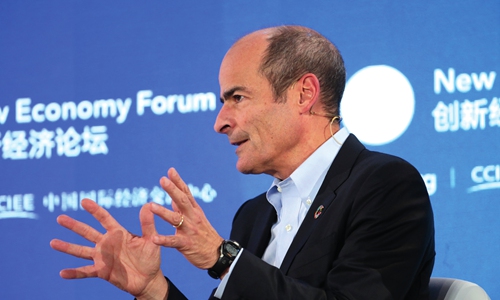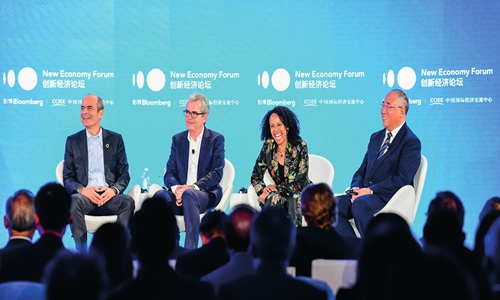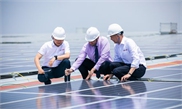SOURCE / INDUSTRIES
Brewer takes on global warming
In virtue of modern technologies, AB InBev’s projects set example of green community

Carlos Brito, chief executive officer of AB InBev at the New Economy Forum in Beijing on Thursday Photo: Courtesy of AB InBev

(From left) Carlos Brito, CEO of AB InBev, Pablo Isla, executive chairman of Inditex, Sara Menker, founder and CEO of Gro Intelligence, and Xie Zhenhua, special representative for climate change affairs of China at the panel discussion about climate Photo: Courtesy of AB InBev
"No water, no beer - it's that simple. So sustainability is our business. It is not like a part nice to have - it is our business," Carlos Brito, chief executive officer of world leading beer brewer AB InBev, said at the New Economy Forum (NEF) in Beijing on Thursday, calling for greater synergies along the whole value chain to address climate change.Under the theme of "a new community for the new economy," this year's event, an invite-only idea hub co-hosted by Bloomberg and the China Center for International Economic Exchanges, aimed to propose pragmatic solutions to address prevailing challenges that emerge during the transition to the "new economy." Bringing together about 500 leading corporate executives, technology innovators, government officials and experts and scholars, the annual celebration of great minds focused on a number of key agendas including global economic governance, trade, science and technology, capital market, climate change, inclusive development and urbanization.
Facing climate challenge
As climate change has become a global challenge, environmental discussions are no longer absent in forums like the NEF, and many pioneers have called for international action to reach the goal of zero emissions by 2050.
Microsoft Corp. co-founder Bill Gates expressed optimistic opinion at the forum, saying that people's willingness and awareness about protecting the environment are rising, especially that young generation is paying more attention to sustainable development. However, he also pointed there are more about climate change to be done through innovation and international cooperation.
Among the minister-and-executive-level invitees, Carlos Brito spoke at a much-followed main stage panel discussion moderated by Ian Bremmer, founder and CEO of Eurasia Group and GZERO Media.
Brito was joined by other key opinion leaders including Xie Zhenhua, special representative for climate change affairs of China and leaders from US big-data firm Gro-Intelligence and Spain's Inditex for an exceptional debate and exchange of ideas over the topic Climate Change to Climate Action called "Saving the World."
"Two years ago we announced that by the year 2025 we would like to have 100 percent of our purchase electricity coming from renewable sources. And in two years from 0 percent we are already reaching 50 percent by the end of this year," Brito said.
"We are a global company. Together with other global companies, we sit down with governments and see how we can try to make this a better place," Brito urged.
Xie echoed Brito's opinion, saying that facing the challenges of climate change requires multilateral cooperation and a global carbon emission reduction goal.
"China has always sought a multilateral system on climate change negotiations, and is willing to work with the US to help reign in global warming," Xie said at the discussion.
"By promoting technological advancements and large-scale applications, China has reduced the threshold and cost of renewable energy, so that relevant technologies and experiences can not only serve its own development, but also provide reference for other countries. I think this is a major trend for our future development," Xie noted.
Brito reiterated the company's alignment with the UN Sustainable Development Goals. To achieve such goals, AB InBev has been using its impactful scale to not only focus on the sustainability of its own business, but also extend it to the whole value chain. Its ongoing sustainability initiatives strive to cater to specific goals such as renewable energy, energy efficiency, and the application of innovations.
Embracing new energy
The brewer's Power Purchase Agreements are shifting more than six terawatt-hours of electricity annually to renewable sources in the markets where it operates, which will help transform the energy industry in several countries. The brewer is looking to have about half of its breweries in China powered by photovoltaic projects by the end of 2020.
Beyond renewable electricity, Brito also specifically elaborated on AB InBev's investments in global smart agriculture: "We take advantage of the 30,000 growers and farmers that we have relationships with for more than 30 years around the world on all continents, and we're using now more and more technologies and data analytics to predict conditions of micro-climates, soils, and seeds and to try to instruct them in exchanges of best practices. So they know when to harvest, when to plant. So they can really minimize the impact they have on the environment. And we have already 10,000 of the 30,000 connected to the technology, in terms of data sharing."
Since first entering the China market, AB InBev has made a combined investment of more than $3 billion dollars in more than 30 large-scale breweries. Believing that the private sector has a critical role to play, AB InBev has been actively responding to the Chinese government's reduction pledges, turning to practical solutions including renewable electricity and green logistics to cut carbon emission.
In terms of renewable energy, it is expected that by the end of the year, nine of AB InBev's breweries in China will be installed with photovoltaic panels that cover a combined area of 410,000 square meters, equal to the size of 57 standard soccer pitches - they represent a total installed capacity of 41 megawatts.

